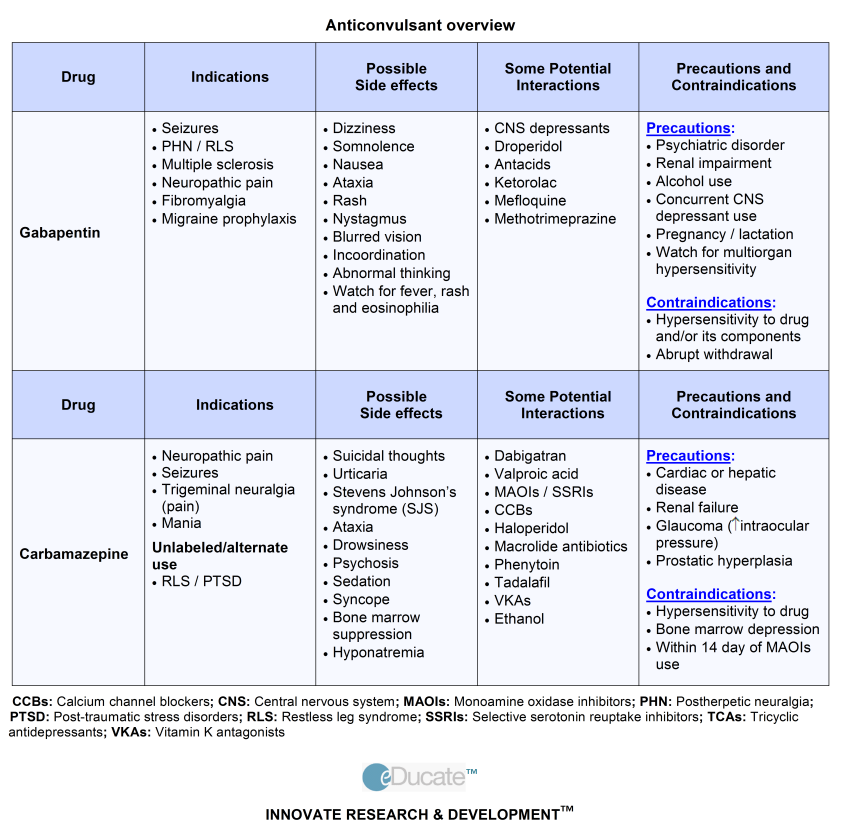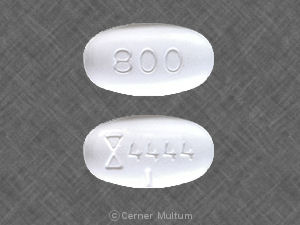Gabapentin comes as a capsule, a tablet, an extended-release (long-acting) tablet, and an oral solution (liquid) to take by mouth. Gabapentin capsules, tablets, and oral solution are usually taken with a full glass of water (8 ounces [240 milliliters]), with or without food, three times a day.
Gabapentin should be taken at evenly spaced times throughout the day and night; no more than 12 hours should pass between doses. The extended-release tablet (Horizant) is taken with food once daily at about 5 PM. Follow the directions on your prescription label carefully, and ask your doctor or pharmacist to explain any part you do not understand. Take gabapentin exactly as directed. Do not take more or less of it or take it more often than prescribed by your doctor.
Gabapentin extended-release tablets cannot be substituted for another type of gabapentin product. Be sure that you receive only the type of gabapentin that was prescribed by your doctor. Ask your pharmacist if you have any questions about the type of gabapentin you were given.
Swallow the extended-release tablets whole; do not cut, chew, or crush them.
If your doctor tells you to take one-half of a regular tablet as part of your dose, carefully split the tablet along the score mark. Use the other half-tablet as part of your next dose. Properly throw away any half-tablets that you have not used within several days of breaking them.
If you are taking gabapentin to control seizures or PHN, your doctor will probably start you on a low dose of gabapentin and gradually increase your dose as needed to treat your condition. If you are taking gabapentin to treat PHN, tell your doctor if your symptoms do not improve during your treatment.
Gabapentin may help to control your condition but will not cure it. Continue to take gabapentin even if you feel well. Do not stop taking gabapentin without talking to your doctor, even if you experience side effects such as unusual changes in behavior or mood. If you suddenly stop taking gabapentin tablets, capsules, or oral solution, you may experience withdrawal symptoms such as anxiety, difficulty falling asleep or staying asleep, nausea, pain, and sweating. If you are taking gabapentin to treat seizures and you suddenly stop taking the medication, you may experience seizures more often. Your doctor may decrease your dose gradually over at least a week.
Your doctor or pharmacist will give you the manufacturer’s patient information sheet (Medication Guide) when you begin treatment with gabapentin and each time you refill your prescription. Read the information carefully and ask your doctor or pharmacist if you have any questions. You can also visit the Food and Drug Administration (FDA) website (http://www.fda.gov/Drugs) or the manufacturer’s website to obtain the Medication Guide.

Abuse of Gabapentin
The stance of the DEA is that gabapentin is not a significant drug of abuse and does not have a significant capability to produce physical dependence. Similar drugs to gabapentin, such as pregabalin (brand name Lyrica), are classified as controlled substances; Lyrica is classified as Schedule V. Research evidence has indicated that there are some isolated reports of individuals abusing gabapentin; however, these appear to be rather extreme cases.
The Substance Abuse and Mental Health Services Administration (SAMHSA) reports that as an overall estimate, 80 percent of people with prescriptions for medications do not abuse them. The actual figures of misuse vary from medication to medication with prescription opiate drugs, benzodiazepines, and some sedatives having higher rates of misuse. However, it is clear from the research that the majority of people who are prescribed medications do not abuse them, even if they do develop some level of physical dependence on them as a result of using them for medicinal reasons.
The risk of a person abusing a prescription medication increases if the person’s use of the medication is not closely monitored by their physician. For instance, individuals now prescribed narcotic medications in the United States have difficulty legally obtaining more of the medication if they use their prescription up too quickly. Likewise, an individual abusing gabapentin who has a prescription for the medication would most likely use significantly more of the drug than prescribed, and physicians should recognize this and take steps to assist the person (e.g., discuss substance abuse with them, limit the amount of the drug they have access to, etc.). Thus, while any medication can be abused, gabapentin abuse is most likely not a major issue for individuals who are prescribed the drug, and individuals who have a prescription for the drug and abuse it should be relatively easy to recognize.
Unlike prescription opiate medications, gabapentin is not a drug that is in large demand by potential drug abusers. There is research evidence that use of high doses of gabapentin or very long-term use of the drug may produce a mild form of physical dependence. Withdrawal symptoms from gabapentin appear to be mild in the same way that withdrawal from antidepressant medications is relatively mild compared to withdrawal from other drugs.

Is gabapentin ok for child ?
Hi John
Gabapentin is not suitable for child under 12 years old. When your child is older than 12 years old, you must go to your local doctors to prescribe gabapentin for your child. Online Gabapentin is not suitable for children and first time adult patients. Online Gabapentin is only for refill patients who already knew the warning, side effects and interaction of gabapentin.